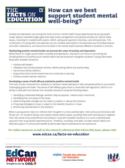What is Effective Teacher Professional Development?
One of the clearest findings from modern research is that “one-time” workshops have little long-term impact on how someone teaches.
Download the Fact Sheet. (234.67 kB / pdf)
DownloadProfessional development (PD or ProD) can be defined as teachers’ ongoing learning to improve the way they teach, and it occurs in both formal and informal ways. PD days are the most familiar formal structure of professional development and usually feature a combination of presentations, hands-on workshops, and collaborative teamwork that are often organized in advance by school and school district leadership. Teachers also routinely set their own, informal, ongoing PD agendas, such as taking additional courses, pursuing graduate study, personal study of their subject matter or teaching approaches, sharing resources and ideas with colleagues, and building learning networks through social media.
According to research, effective teacher professional development:
- Recognizes that teachers are professionals who should be given an opportunity to select what they would like to learn from a variety of research-based ideas about improving students’ learning.
- Provides long-term, ongoing opportunities for teachers to reflect upon both their chosen and mandatory PD experiences.
- Provides opportunities for teachers to coach one another and work together to analyze new teaching techniques, which often connects new teachers with experienced colleagues.
- Provides opportunities for teachers to study and gather data on the effects of changes in their teaching approach, particularly in response to new ideas or initiatives in education.
One of the clearest findings from modern research is that “one-time” workshops have little long-term impact on how someone teaches. Research also confirms that all forms of PD require a sustained commitment of time and resources; that teachers need to have the chance to put what they learned into practice and to reflect on how new ideas and teaching approaches work within their classrooms; and that students are more successful when teachers have meaningful, ongoing, PD opportunities.
Additional Information Resources
- Collaborative Inquiry: Empowering teachers in their professional development – By Leyton Schnellert
- Teacher Learning That Supports Student Learning – By Linda Darling-Hammond
- Historical Thinking and Teacher Professional Development: The Poor Cousin of Curriculum Reform – By Carla Peck
- Self-guided Professional Development resources (BC Ministry of Education)
References
Bullock, S. M. (2014). Exploring the impact of prior experiences in non-formal education on my pedagogy of teacher education. Studying Teacher Education, 10(2), 103-116.
Charner-Laird, M. (2007, April). Ready and willing: Second-stage teachers and professional collaboration. Paper presented at the annual meeting of the American Educational Research Association, Chicago, IL.
Chou, C. (2011). Teachers’ professional development: Investigating teachers’ learning to do action research in a professional learning community. Asia-Pacific Education Researcher, 20(3), 421-437.
Hunzicker, J. (2011). Effective professional development for teachers: A checklist. Professional Development in Education, 37(2), 177-179.
Kim, J. (2013). Teacher action research as Bildung: An application of Gadamer’s philosophical hermeneutics to teacher professional development. Journal of Curriculum Studies, 45(3), 379-393.
Liu, K. Y. (2012). A design framework for online teacher professional development communities. Asia Pacific Education Review, 13(4), 701-711.
McConnell, T. J., Parker, J. M., Eberhardt, J., Koehler, M. J., & Lundeberg, M. A. (2013). Virtual professional learning communities: Teachers’ perceptions of virtual versus face-to-face professional development. Journal of Science Education and Technology, 22(3), 267-277.
Marsh, B., & Mitchell, N. (2014). The role of video in teacher professional development. Teacher Development, 18(3), 403-417.
Mor, Y., & Mogilevsky, O. (2013). The learning design studio: Collaborative design inquiry as teachers’ professional development. Research in Learning Technology, 21(2), 1-15.
Opfer, V. D., & Pedder, D. (2011). Conceptualizing teacher professional learning. Review of Educational Research, 81(3), 376-407.
Russell, M., Masters, J., Magidin de Kramer, R., O’Dwyer, L., & Dash, S. (2012). Relationship of online teacher professional development to seventh-grade teachers’ and students’ knowledge and practices in English language arts. The Teacher Educator, 47(3), 236.
Roseler, K. & Dentzau, M. (2013).Teacher professional development: a different perspective. Cultural Studies of Science Education, 8(3), 619-622.
Saka, Y. (2013). Who are the science teachers that seek professional development in research experience for teachers (RET’s)? implications for teacher professional development. Journal of Science Education and Technology, 22(6), 934-951.
Tack, H., & Vanderlinde, R. (2014). Teacher educators’ professional development: Towards a typology of teacher educators’ researcherly disposition. British Journal of Educational Studies, 62(3), 297-315.
Taylor, M., Yates, A., Meyer, L., Kinsella, P. (2011) Teacher professional leadership in support of teacher professional development. Teaching and Teacher Education, 27(1), 85-94.
Wenger, E. (1998). Communities of practice: Learning, meaning, and identity. Cambridge, U.K.: Cambridge University Press.

